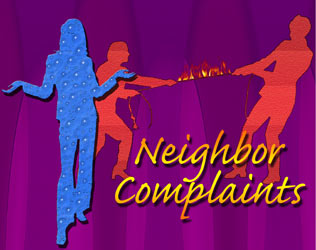
Neighbor complaints probably generate the greatest number of phone calls to a property manager from homeowners living in a community association. My neighbor won't pick up after his dog. My neighbor parks his pick up truck outside. The kids next door play the stereo full blast at two in the morning. My neighbor's grass is two feet tall. My neighbor leaves the garbage cans out all day. How come my neighbor can have a 95-pound Rottweiler and I can't?!?
In most associations, these such issues fall under the category of deed restriction enforcement. Association documents usually spell out, in detail, how these kinds of situations are handled. Your property manager should meet with the Board of Directors of your community, review your documents, and establish a written enforcement policy.
Typically, this enforcement policy of a property manager or Board Member consists of verifying whether there actually is a violation. Often, a friendly personal visit will solve the problem and the issue becomes settled. Sometimes, Boards prefer to handle the entire process in writing. Once a violation is confirmed, a brief and courteous letter is sent to the offending neighbor explaining the nature of the problem. It is also important that this first letter establish that a violation of your association documents has occurred and must be resolved within a certain time frame. Most violations are resolved with the first letter. If this doesn't work, a second letter is sent. This one should be sent certified, return receipt requested. It should also be stronger in tone than the first, yet it should always remain business-like. Definite, clear and concise consequences should be mentioned, such as the Board may be forced to take legal action or the association documents allow a fine of $25.00 be imposed if this is not resolved. Finally, if these efforts fail, your association fining procedure should be implemented. If your association has no fining procedure, the matter should be referred to the association attorney.
The existence of deed restrictions is often the primary reason an owner chooses to live in an association. Fair and uniform enforcement of an association's deed restrictions is critical to maintaining property values. Association deed restriction cases are typically overturned in the courts if there has been inconsistent application of an association's rules and regulations over the years. If an association board has any questions concerning deed restrictions and their enforcement, a qualified association attorney should be consulted.
Related Articles
- What is an HOA or Homeowner Association?
- How to Start a Neighborhood Association
- HOA Website Can Save Money And Increase Communication
- How Neighborhood Assoc Websites Can Increase Participation
- A Condo Association Website Can Facilitate Communication
- Neighborhood Watch-How to Start One!
- Utilizing a Neighborhood Watch Website
- An Effective Meeting Agenda
- Funding a Reserve Study
- HOA Maintenance - Who Has Responsibility for What?
- Budget Preparation Tips
- Directory of Association Articles
 Print
Print Email
Email







